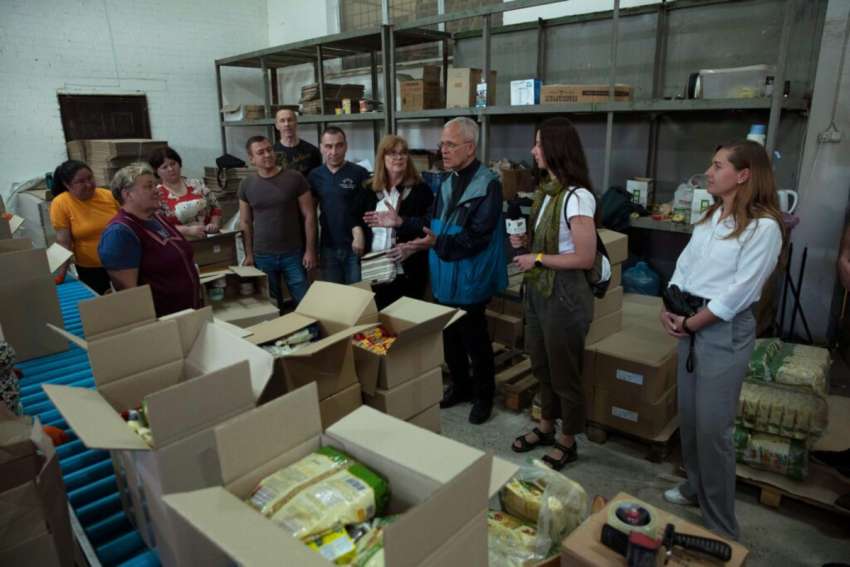Dombrovska recently returned from Ukraine where she was part of a CNEWA team checking on the charity’s numerous projects there.
Accompanied by national director Adriana Bara and president Msgr. Peter Vaccari, the Ottawa-based Dombrovska was in western Ukraine, where the group heard heartbreaking stories and experienced first hand scenes of devastation and destruction. But they also saw heartwarming signs of resilience, faith, hope and deep gratitude to CNEWA’s donors and supporters in Canada and around the world.
“Seeing destroyed buildings, damaged churches and displaced, homeless people had the biggest emotional impact on me,” said Dombrovska, who was born in Ukraine and still has family there.
Dombrovska said on a visit to Irpin, a town northwest of Kyiv, she met Fr. Myroslav Latynnyk, who had stayed for weeks with his remaining parishioners in the basement of the Holy Mother of God Ukrainian Greek Catholic Church, venturing out from time to time at great risk to get food for the group.
“Fr. Latynnk gave me a piece of the Russian missile that damaged the church,” she said, adding that Irpin is now part of the “de-occupied” (liberated) territory, but much work remains to be done.
The team visited the Kyiv seminary, a long-standing project of CNEWA supported by the Ukrainian Catholic Eparchy of Edmonton. Here, seminarians are trained to help in the challenging territories east of Kyiv. Because of the heavy toll taken by the war, traumatized people in the region are desperately in need of spiritual and psychological counselling.
“The people who receive these services are so grateful to the Fathers and the seminarians,” Dombrovska said. “The war is not over yet, and we don’t know when it will be,” adding that this will be an ongoing need long after the air raid sirens have been silenced.
The sights and sounds of war are everywhere, Bara told The Register.
“As we settled in at the Ukrainian Catholic University (UCU) in Lviv where we stayed, I could feel we were in a country at war,” Bara said. “Every day, we were compelled by air raid sirens to run for shelter. When we were able to go out, we visited many of our projects, including the orphanage for children with disabilities which we run in collaboration with UCU.”
She said they were happy to see that the children were in good hands, in a calm and peaceful atmosphere, and surrounded by love.
Both Bara and Dombrovska described an important and critically needed project called “Food Boxes for Ukraine” which CNEWA started with the Ukrainian Greek Catholic Church.
“We were touched by volunteers packing boxes of food for displaced persons, drivers delivering essential supplies to those with dire needs, risking their own lives in the process, religious brothers and sisters transforming monasteries into save havens for those left homeless by the war, and nuns offering young orphans a warm and loving place to continue their studies,” said Bara.
The group was in Ukraine when the dam burst in the Russian-controlled region of Kherson in early June, destroying homes, farms and all infrastructure in the low-lying area on both sides of the River Dnipro. Thousands of people had to be evacuated.
Dombrovska said the “Food Boxes for Ukraine” project was filling a critical need there.
“We met an old lady from there who had lived through World War II, but now with the dam explosion, she lost her home,” Bara said.
Another CNEWA project, the Sheptytsky Hospital, provides palliative care as well as social and humanitarian services for terminally ill, internally displaced people.
“Working for CNEWA in Ukraine is like working in the emergency department of a hospital,” Dombrovksa said. “You never know what disaster would strike next, because of course these emergencies don’t run on a schedule.”
And even when the war is over, the road to reconstruction and rehabilitation will be a long and arduous one, and the needs just as urgent, she pointed out.
Nevertheless, both Bara and Dombrovska were heartened by the resilience, spirit of solidarity and determination of the Ukrainian people to reclaim their land; also, their sincere gratitude to CNEWA, and to the bishops and priests of the Ukrainian Greek Catholic Church for their support.
“CNEWA is an ambassador of peace and love,” said Bara.
“Our donors are very responsive to the need there,” Dombrovka added. “It was a gift to have had the opportunity to go there, and see how CNEWA is helping people in need.”


